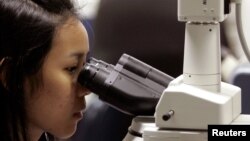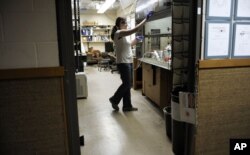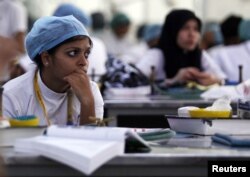Across the globe, fewer women are enrolling in college science programs or working in the science and technology sectors and education experts are blaming the problem on stereotypes about what a scientist looks like.
In some scientific fields, women represent less than 30 percent of student enrollments and about the same percentage of the workforce, according to a global study of the issue.
That study, the Gender Equality and the Knowledge Society Scoreboard, was in part carried out by the Women in Global Science and Technology, a non-profit policy and research group. The study described the percentage of women in the sciences as “alarmingly low.”
“Women are severely underrepresented in degree programs in science and technology,” said Sophia Huyer, executive director of Women in Global Science and Technology.
Huyer said women in the countries surveyed, including the United States and the European Union, represented less than 30 percent of physics and engineering enrollments and around 30 percent or less of the science and technology workforce. The only exception is in biosciences and life sciences where women hover around 50 percent.
Corinne Moss-Racusin, a Yale University postdoctoral associate did a recent study on bias in the sciences and concluded that more women at lower professional levels are stuck in their careers, even after getting their Ph.D. degrees. “They’re not supported or encouraged to remain in the… field in the same way as perhaps that men are,” she said.
Moss-Racusin’s work also indicated that women professors and bosses were as likely to exhibit gender bias against female students as men. She said this is due to traditional gender stereotypes that frame science as masculine and women scientists as less competent.
Citing another study, Toni Schmader, Canada Research Chair in Social Psychology at the University of British Columbia in Vancouver, said “students who take more math and science with male instructors develop strong math-equals-male biases over the course of their first year in university.
“You might say that our implicit biases are the stuff the glass ceiling is made of,” Schmader added.
The impressionable brain
While most people would probably deny being biased, Lisa Wade of Occidental College in California said, “every single time we see a scientist as a man, our brain records that. Or every time we see scientific items associated with men, our brains record that. It’s the idea that physics is a masculine thing to do – our brain records all of this.”
So for a female scientist, Wade said success means “a certain kind of masculinity that, when women perform it, they’re seen as non-likable and when they don’t perform it, they’re seen as incompetent.”
Wade, chair of Occidental College's sociology department, said she was not surprised by these trends, noting that women’s progress has been stalling, at least in the United States, since the 1990s. She cited two reasons: first, that while women have been encouraged to go out and work, no comparable revolution has occurred to encourage men to stay home.
“And the other is because, I believe, we’ve had a cultural backlash against it,” she added. “The idea that women should continue to get married and have children and that once they have children they have primary responsibility for those children - that’s a big problem in terms of slowing women down and reaching equity with men.”
And that is the perception in many parts of the world - that “women are supposed to get married and have children and not participate in the workforce or the public life of their country,” said Huyer, citing the example of Korea, where women attend school in equal or higher numbers than men, but they then get married and stay home.
“Countries are supporting women to get into the sciences - even though it’s not equal levels - they’re supporting them, they’re paying for them …but then they’re not getting into the workforce,” Huyer said. This is a waste of investment and talent, particularly for developing countries that educate their workforce and then lose them to the developed world. “They really can’t afford to ignore the abilities of half their population,” she said.
Huyer said this is true in many parts of Asia, with the exception of India, where women have higher rates of participation in biosciences, health sciences, and medical fields.
Nevertheless, certain biases do show up in India. Science student Souvik GT said a university staff member told a female student who is getting married and plans to continue her studies after marriage, “What’s the use of studying after marriage? You are getting married, now you can leave college and carry on with your full time ‘wife duty.’”
Is science masculine?
But in many cases, Huyer said girls are reluctant to go into science “because they say they can’t do math as well - they’re not good at physics; they’re not good at this; they’re no good at that. And in many countries … the perception is that men are much better at these skills, which we know is not true.”
But Jill Payne McDonald, a chemist in the United States, said this isn’t sexism. “If one does not display confidence in his or her abilities, no one else will either,” she said. McDonald noted that she has often seen men with less experience or abilities promoted over women with greater experience and abilities, but with less confidence in themselves.
Some studies have suggested women are interested in exploring career options in male-dominated fields like computer science, for example, if stereotypes of computer scientists were different.
Changing stereotypes and biases requires individuals to be aware of their biases. “It requires a reeducation of at least that individual,” said Occidental’s Wade. “On a societal level, what we have to do is stop associating science with men and masculinity … so that our brains don’t develop that structure in the first place.”
Even when aware, Schmader said individuals have to be motivated to get beyond their assumptions of what a scientist is supposed to look like.
In some scientific fields, women represent less than 30 percent of student enrollments and about the same percentage of the workforce, according to a global study of the issue.
That study, the Gender Equality and the Knowledge Society Scoreboard, was in part carried out by the Women in Global Science and Technology, a non-profit policy and research group. The study described the percentage of women in the sciences as “alarmingly low.”
“Women are severely underrepresented in degree programs in science and technology,” said Sophia Huyer, executive director of Women in Global Science and Technology.
Huyer said women in the countries surveyed, including the United States and the European Union, represented less than 30 percent of physics and engineering enrollments and around 30 percent or less of the science and technology workforce. The only exception is in biosciences and life sciences where women hover around 50 percent.
Corinne Moss-Racusin, a Yale University postdoctoral associate did a recent study on bias in the sciences and concluded that more women at lower professional levels are stuck in their careers, even after getting their Ph.D. degrees. “They’re not supported or encouraged to remain in the… field in the same way as perhaps that men are,” she said.
Moss-Racusin’s work also indicated that women professors and bosses were as likely to exhibit gender bias against female students as men. She said this is due to traditional gender stereotypes that frame science as masculine and women scientists as less competent.
Citing another study, Toni Schmader, Canada Research Chair in Social Psychology at the University of British Columbia in Vancouver, said “students who take more math and science with male instructors develop strong math-equals-male biases over the course of their first year in university.
“You might say that our implicit biases are the stuff the glass ceiling is made of,” Schmader added.
The impressionable brain
While most people would probably deny being biased, Lisa Wade of Occidental College in California said, “every single time we see a scientist as a man, our brain records that. Or every time we see scientific items associated with men, our brains record that. It’s the idea that physics is a masculine thing to do – our brain records all of this.”
So for a female scientist, Wade said success means “a certain kind of masculinity that, when women perform it, they’re seen as non-likable and when they don’t perform it, they’re seen as incompetent.”
Wade, chair of Occidental College's sociology department, said she was not surprised by these trends, noting that women’s progress has been stalling, at least in the United States, since the 1990s. She cited two reasons: first, that while women have been encouraged to go out and work, no comparable revolution has occurred to encourage men to stay home.
“And the other is because, I believe, we’ve had a cultural backlash against it,” she added. “The idea that women should continue to get married and have children and that once they have children they have primary responsibility for those children - that’s a big problem in terms of slowing women down and reaching equity with men.”
And that is the perception in many parts of the world - that “women are supposed to get married and have children and not participate in the workforce or the public life of their country,” said Huyer, citing the example of Korea, where women attend school in equal or higher numbers than men, but they then get married and stay home.
“Countries are supporting women to get into the sciences - even though it’s not equal levels - they’re supporting them, they’re paying for them …but then they’re not getting into the workforce,” Huyer said. This is a waste of investment and talent, particularly for developing countries that educate their workforce and then lose them to the developed world. “They really can’t afford to ignore the abilities of half their population,” she said.
Huyer said this is true in many parts of Asia, with the exception of India, where women have higher rates of participation in biosciences, health sciences, and medical fields.
Nevertheless, certain biases do show up in India. Science student Souvik GT said a university staff member told a female student who is getting married and plans to continue her studies after marriage, “What’s the use of studying after marriage? You are getting married, now you can leave college and carry on with your full time ‘wife duty.’”
Is science masculine?
But in many cases, Huyer said girls are reluctant to go into science “because they say they can’t do math as well - they’re not good at physics; they’re not good at this; they’re no good at that. And in many countries … the perception is that men are much better at these skills, which we know is not true.”
But Jill Payne McDonald, a chemist in the United States, said this isn’t sexism. “If one does not display confidence in his or her abilities, no one else will either,” she said. McDonald noted that she has often seen men with less experience or abilities promoted over women with greater experience and abilities, but with less confidence in themselves.
Some studies have suggested women are interested in exploring career options in male-dominated fields like computer science, for example, if stereotypes of computer scientists were different.
Changing stereotypes and biases requires individuals to be aware of their biases. “It requires a reeducation of at least that individual,” said Occidental’s Wade. “On a societal level, what we have to do is stop associating science with men and masculinity … so that our brains don’t develop that structure in the first place.”
Even when aware, Schmader said individuals have to be motivated to get beyond their assumptions of what a scientist is supposed to look like.








